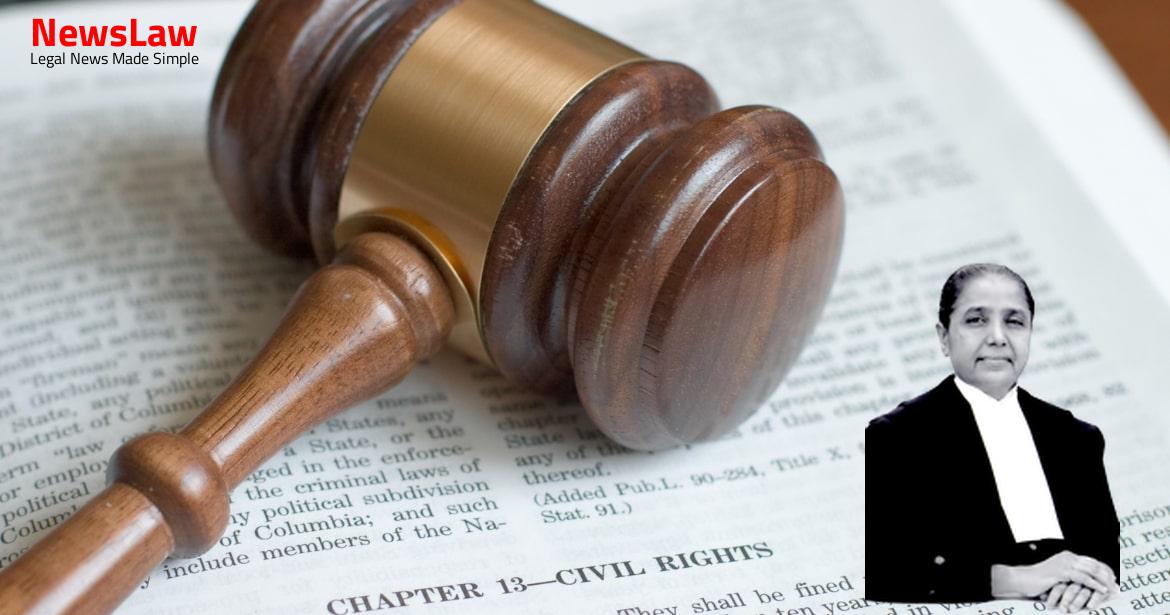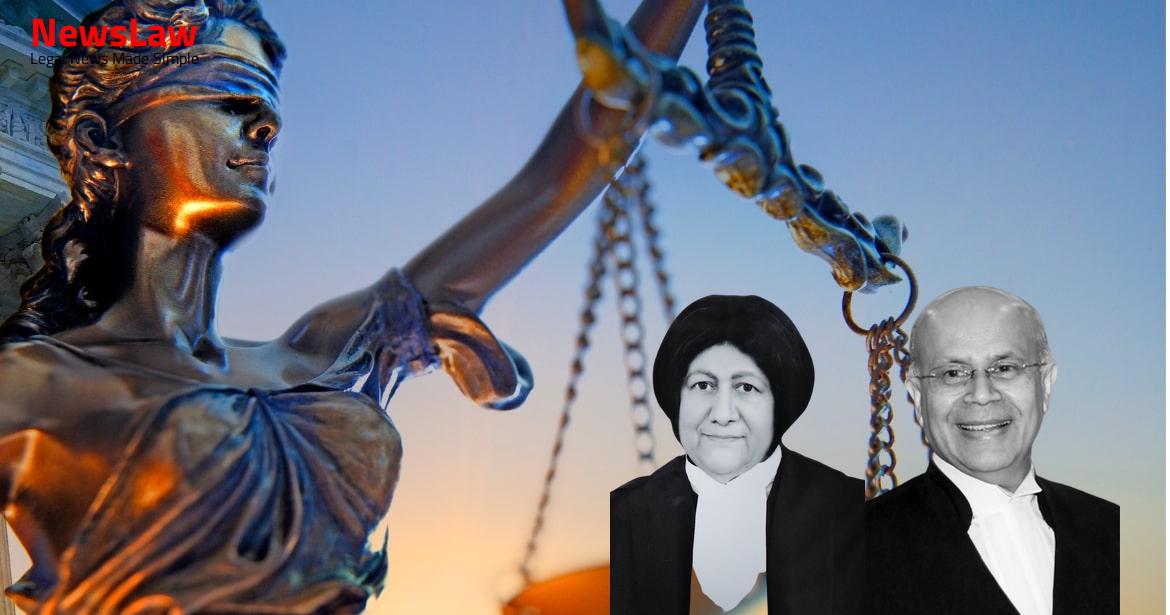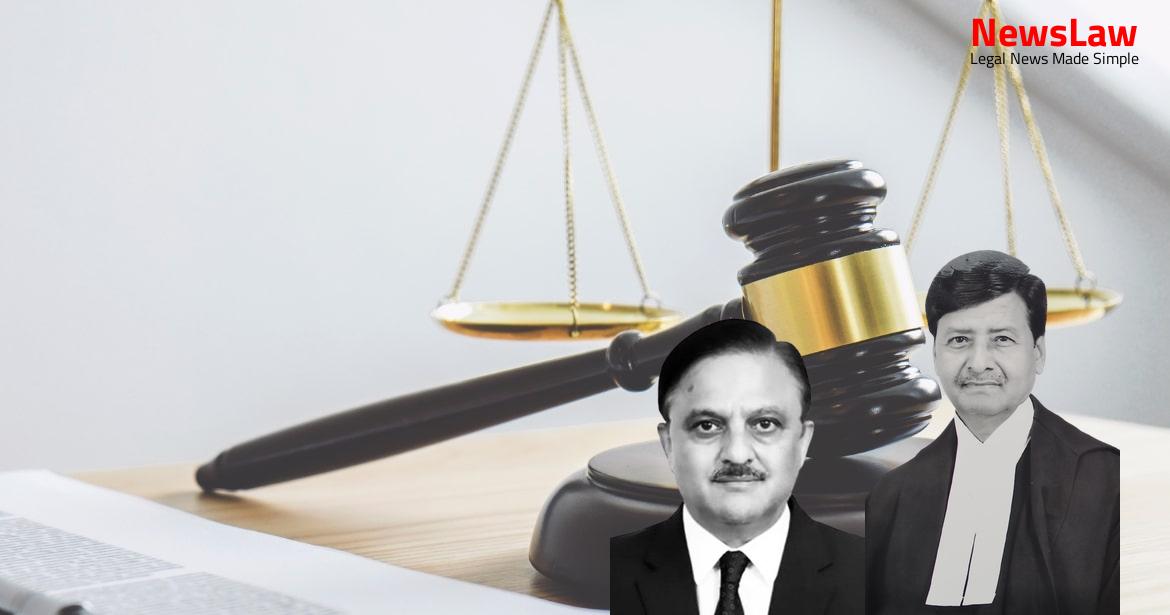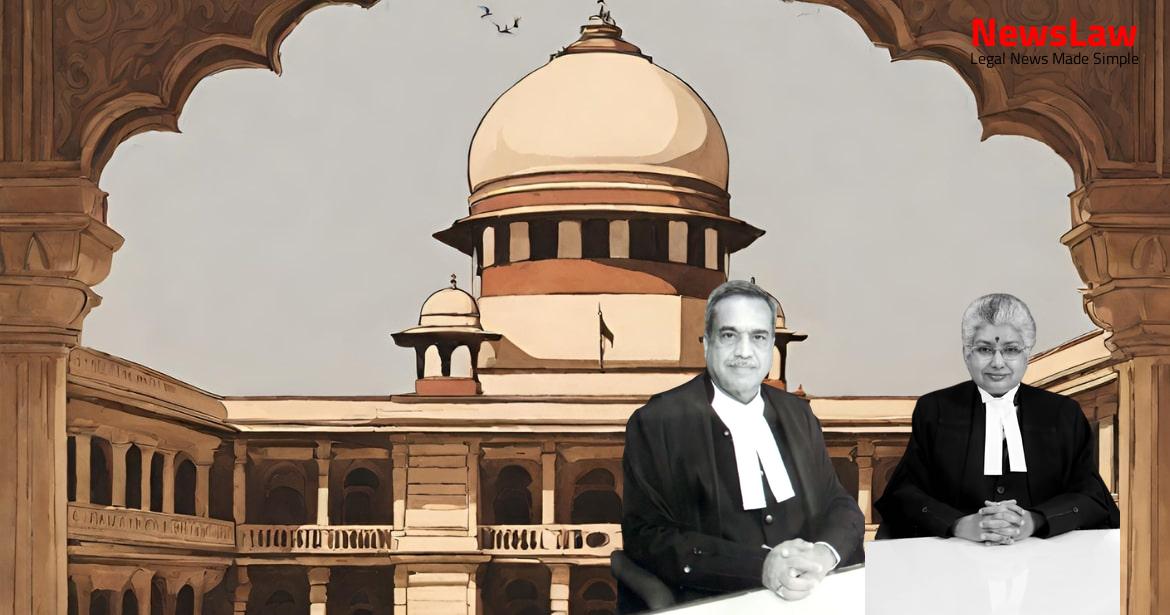In the recent legal case involving the Plaintiff and Defendant No.1, a dispute over specific performance of an agreement to sell dated 30.3.2000 unfolded. The High Court’s confirmation of the trial court’s decree in favor of the Plaintiff raised questions regarding readiness and willingness to perform the contract, as well as the bar of limitation. The appellate jurisdiction came into play, leading to the case being remanded for fresh disposal. Follow the legal battle between the parties as the matter navigates through the judicial process.
Facts
- Plaintiff filed suit for specific performance of agreement to sell dated 30.3.2000.
- Defendant No.1 admitted execution of the agreement.
- High Court confirmed trial court’s decree in favor of plaintiff.
- Defendant No.1 was examined as DW1 along with other witnesses.
- Defendant contended suit was barred by limitation.
- Issue: Whether plaintiff proved readiness and willingness to perform contract?
- Issue: Whether suit barred by limitation?
- Plaintiff examined as PW-1 with supporting documents.
- The plaintiff was found to not be ready and willing to perform his part of the contract
- Upon examination of the evidence presented, the trial court determined that the suit was time-barred
- As a result, the suit was dismissed
Also Read: Interpretation of Government Premises in Eviction Proceedings
Issue
- The trial court framed the following issue: Whether the plaintiff proves that the defendants and their father executed an agreement to sell on 30.3.2000 for Rs.2,00,000 in favor of the plaintiff after receiving Rs.1,50,000 as earnest money?
- This issue centers around the key question of whether the plaintiff can provide sufficient evidence to prove the execution of the agreement and the payment of earnest money.
- The outcome of this issue will likely have a significant impact on the overall case and determine the parties’ rights and obligations under the alleged contract.
Also Read: Ensuring Fairness: Court’s Discretion in Document Production
Arguments
- Argument presented that the High Court’s judgment was cryptic without a proper reappreciation of evidence on record.
- Claimed that the first appeal filed by the plaintiff should have been a continuation of the suit, requiring a reassessment of all evidence.
- Alleged that the High Court, as an appellate court, did not adhere to the guidelines under Order XLI Rule 31 of the CPC.
- Stated that the agreement to sell allowed three years from the date of the agreement for completion, and the suit was filed within this time period.
- Reference made to Article 54 of the Limitation Act, 1963, to support the timeliness of the suit.
Also Read: Legal Battle Over Elephant Corridors
Analysis
- The appellate jurisdiction can be exercised in various forms as prescribed by the Legislature.
- Agreement with the reasons given by the trial court is generally sufficient.
- The appeal before the High Court involved disputed questions of law and fact.
- Judicial examination of decision by a higher court over a decision of a subordinate court to rectify potential errors in the order under appeal.
- Issues regarding readiness and willingness of the plaintiff to perform the contract and limitation were decided against the plaintiff, leading to the dismissal of the suit.
- Section 96 of CPC allows appeals from decrees of courts exercising original jurisdiction to authorized appellate courts.
- In this case, the appeal from the trial court’s decree goes to the High Court.
- Appellate court can reverse or affirm trial court’s findings.
- First appeal allows rehearing on both factual and legal matters, unless restricted by law.
- An appeal is defined as a proceeding to have a decision reconsidered by a higher authority.
- Appellate court need not restate evidence or reasons if it agrees with trial court’s views.
- High Court dismissed the appeal without thorough examination, leading to a cryptic order.
- Appellate court must consciously apply its mind, provide reasons, and address all issues and contentions brought forth by parties.
- High Court, sitting as a first appeal court, was obligated to consider all evidence and issues before making findings.
- Parties have the right to be heard on legal and factual matters in the first appeal, and the judgment must address all issues with reasons in support.
- The judgment of the first appellate court must set out points for determination, record the decision thereon and give its own reasons.
- Non-observance of the requirements of Order XLI Rule 31 leads to infirmity in the judgment of the first appellate court.
- An appeal is a process of civil law origin and involves a re-hearing on law as well as on fact.
- The first appeal is a valuable right of the appellant allowing all questions of fact and law decided by the trial court to be open for re-consideration.
- The first appellate court must address all issues, record findings supported by reasons, and display a conscious application of mind.
- All issues and contentions must be dealt with, and findings recorded after considering all evidence, oral and documentary.
- A first appeal is distinct from a second appeal under CPC, with second appeals limited to substantial questions of law.
- Order XLI Rule 31 provides guidelines for the appellate court to decide the matter ensuring a re-hearing on law and fact unless limited by statute.
- Appellate jurisdiction revises and corrects proceedings in an already instituted cause without creating a new cause.
- The judgment of the Appellate Court must state points for determination, decision thereon, reasons for decision, and the relief to which the appellant is entitled.
- Principles for disposing of a first appeal include addressing all issues, recording findings with reasons, and following established judicial decisions.
- Points for determination
- Decision on the points
- Reasons for the decision
- Relief to which the appellant is entitled in case of reversal or variation of the decree appealed from
- The High Court failed to follow Order XLI Rule 31 of the CPC in the appeal decision.
- The court did not reassess the evidence or provide a detailed explanation for its decision.
- Mr. Bhat argued that the suit fell within the permissible time under Article 54 of the Limitation Act.
Decision
- The appeal has been allowed in part
- The judgment and decree of the High Court in RFA No. 1731 of 2006 has been set aside
- The matter has been remanded to the High Court for fresh disposal
- All contentions of the parties are left open
- No order has been passed regarding costs
Case Title: MALLURU MALLAPPA(D) THR. LRS Vs. KURUVATHAPPA (2020 INSC 173)
Case Number: C.A. No.-001485-001485 / 2020



